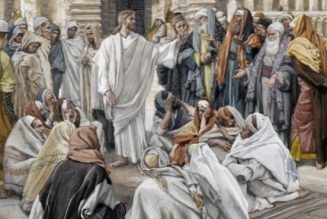The story of the Blind Men and the Elephant is found in ancient Jain, Hindu, and Buddhist sources dating all the way back to 500 B.C. The parable is meant to illustrate human fallibility in light of the divine mystery.
The first blind man put out his hand and touched the side of the elephant. “How smooth! An elephant is like a wall.” The second blind man put out his hand and touched the trunk of the elephant. “How round! An elephant is like a snake.” The third blind man put out his hand and touched the tusk of the elephant. “How sharp! An elephant is like a spear.” The fourth blind man put out his hand and touched the leg of the elephant. “How tall! An elephant is like a tree.” The fifth blind man reached out his hand and touched the ear of the elephant. “How wide! An elephant is like a fan.” The sixth blind man put out his hand and touched the tail of the elephant. “How thin! An elephant is like a rope.”
An argument ensued, each blind man thinking his own perception of the elephant was the correct one. The Rajah, awakened by the commotion, called out from the balcony. “The elephant is a big animal,” he said. “Each man touched only one part. You must put all the parts together to find out what an elephant is like.”
Enlightened by the Rajah’s wisdom, the blind men reached agreement. “Each one of us knows only a part. To find out the whole truth we must put all the parts together.”
So too, according to one interpretation, the various perspectives people offer about ultimate questions are just so many partial experiences that capture just a part of reality of the divine mystery. Human beings seeking to understand the transcendent are like blind men. No one has the full truth; every perspective is partial. Only the Rajah, whose father rules the kingdom, sees the whole elephant and enlightens those who accept his perspective.
If Jesus is God from God, then Jesus can accurately tell us about the divine mystery.
What would Thomas Aquinas say about the story of the blind men and the elephant? He would agree that no one has the full truth about God except God alone. Only a divine mind can fully comprehend the divine essence, for only an infinite divine understanding can be comprehensively united with an infinite divine reality. Even for those in heaven, God remains utterly transcendent, beyond comprehensive human understanding, for even those in heaven still have finite minds. For those on earth, the transcendent is even more mysterious. As St. Paul wrote, “For now we see through a glass, darkly; but then face to face: now I know in part; but then shall I know even as also I am known” (1 Cor. 13:12). Human beings cannot fully know the mystery of God. “If I knew Him, I would be Him,” as a medieval Hebrew saying put it.
But what about the Rajah? He has sight, so he is the one who knows the truth about the elephant. His vision of the elephant transcends the partial, fragmentary understanding of the blind men who can only touch part of the elephant. So, at least the Rajah does know the truth about the divine mystery.
But this is a problem for the parable of the blind men and the elephant. As Timothy Keller notes, “The only way you could possibly know that every religion only sees part of the truth is if you assume that you see all the truth.” So, at its heart, the elephant analogy is self-defeating. In his book The Reason for God: Belief in an Age of Skepticism, Keller sums up the contradiction inherent in the ancient story, “How could you know that each blind man only sees part of the elephant unless you claim to be able to see the whole elephant?” In other words, “How could you possibly know that no religion can see the whole truth unless you yourself have the superior, comprehensive knowledge of spiritual reality you just claimed that none of the religions have?”
Indeed, if the Rajah is merely human, how can the Rajah transcend the limitations of human experience? He cannot. No one who is merely human can go beyond the limitations of being human. If the Rajah is merely human, then he must share in the partial and limited human perspective, and thus he would be just one more blind man.
But what if the divine reality became a human reality? What if God was one of us? Well, if this happened, this human being could know more about God than would ever be possible for a mere human being. This human being could transcend the limitations of human reasoning and finite experience, since this human being would be not only human but also divine.
That is, of course, precisely what Jesus of Nazareth claimed. He said, “I am the way, the truth, and the life.” He said, “[God] the Father and I are one.” He said, “Whoever sees me, sees the Father.” Jesus, the Prince of Peace, claimed the insight of the Rajah in the parable by saying, “I am the light of the world. Whoever follows me will never walk in darkness, but will have the light of life.” If Jesus is God from God, then Jesus can accurately tell us about the divine mystery. To find out the whole truth of the divine mystery, God must put all the parts together for us.
Thus, the parable of the blind men and the elephant leads either to contradiction or to Christ.









